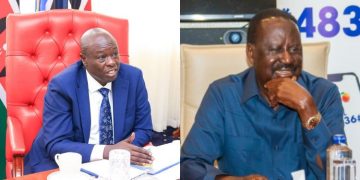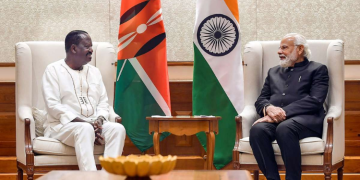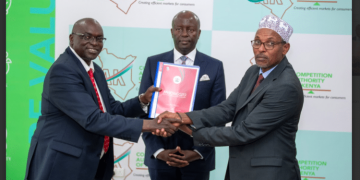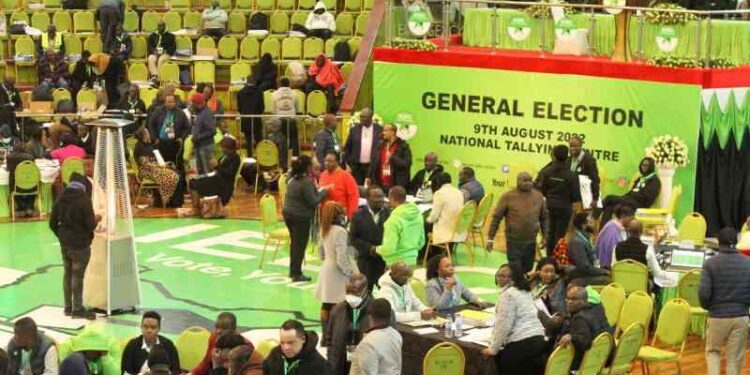Three Kenyan citizens have filed a petition at the Supreme Court of Kenya seeking a declaration that the next presidential election should be held in August 2026, marking the fifth year since the last general election.
They argue that conducting the poll in 2027, as announced by the Independent Electoral and Boundaries Commission (IEBC), would violate the constitutional requirement for regular elections.
In their petition, the citizens led by Dr Oswagi Oswahg reference Article 136(2)(a) of the Constitution of Kenya, 2010, which provides that a presidential election should be held on the second Tuesday of August in the fifth year following the previous election.
The petitioners argue that the most recent presidential election was held on August 9, 2022, meaning the next one should fall on August 11 2026.
“The date frequency of the election as stipulated in Article 136(2)(a) is expressly designed to guarantee and uphold Kenyans’ right under Article 38(2) of the Constitution to regular elections,” the petition reads in part.
“In other words, Kenyans have a constitutional right to presidential elections held regularly every second Tuesday in August of the fifth year.”
The petitioners argue that this right to regular and predictable elections is not just procedural, but fundamental to the democratic process.
Also Read: Can Elections Be Held in 2026?
Three Kenyans Petition Supreme Court to Declare Election in 2026
They emphasize that elections must be held within a defined constitutional framework that upholds the rule of law, transparency, and legal certainty.
“Consequently, and as guided by article 136(2)(a) of the Constitution which requires the next presidential election to be held on the second Tuesday of the fifth year, which fifth year begins on 09 August 2026, Kenya’s next presidential election MUST be held on the second Tuesday of August 2026, being the fifth year,” read the part of the petition.
They also referenced the country’s electoral history, noting that the first general election under the 2010 Constitution was held on 4 March 2013, with the president sworn in on 9 April 2013.
Based on the constitutional timeline, they argue, the second presidential election was held on 8 August 2017, falling on the second Tuesday of August in the fifth year from March 2013 — even though the then-president had served only four years and five months since taking the oath of office.
“This clearly shows that there is no requirement in the Constitution that a president must serve a full five-year term from the date of being sworn in,” the petition adds.
They further insist that upholding specific and regular election timelines is not just a legal technicality but a core pillar of constitutionalism.
“Adherence to these timelines demonstrates respect for human rights and fundamental freedoms, regulates access to and exercise of power in accordance with the rule of law, and ensures the legitimacy of government,” the petition states.
Also Read: Why Kenyan Lawyer Wants the Next Presidential Election in 2026 and Not 2027
Petitioners Emphasize Importance of Certainty in Dates
The petitioners further argue that legal certainty and predictability of the presidential election date are crucial not only for upholding constitutional principles but also for the practical management of elections.
They assert that knowing the exact date of the presidential election well in advance allows the electoral management body to plan effectively.
This includes timely voter registration and the execution of election-related procedures as outlined in Part II and Part III of the Elections Act, 2011.
Additionally, they note that certainty of the election date gives aspiring candidates the time needed to prepare. This includes ensuring compliance with technical requirements, mobilizing financial and logistical resources, and planning for their campaigns within a legally predictable framework.
“The issue of certainty is essential not only for voters and institutions but also for individuals seeking to contest. It promotes fairness, transparency, and inclusivity in the democratic process,” the petition states.
“It is also of particular importance for the management of elections, as elections are a process and not an event; in particular, certainty of the date of the presidential election enables voters to make informed choices.”
Requests to Supreme Court
At the same time, the petitioners argued that if the next presidential election were to be held on the second Tuesday of August 2027, it would contravene Article 136(2)(a) of the Constitution of Kenya, 2010.
They noted that such a date would fall in the sixth year from the last presidential election held on 9 August 2022.
According to them, the sixth year begins on 9 August 2027 and runs until midnight of 8 August 2028, which would be outside the constitutionally mandated five-year term.
The petitioners are asking the Supreme Court to declare that presidential elections must be held in the fifth year following the last general election — not after the fifth year.
They argue that pushing the next presidential poll to 2027, as announced by the IEBC, would effectively extend the presidential term beyond what the Constitution allows.
They further seek a declaration that, pursuant to Article 259(5) of the Constitution of Kenya, 2010, the timeline for computing the date of the next presidential election begins on the day of the previous election and ends on the day preceding the corresponding date in the fifth year.
Follow our WhatsApp Channel and X Account for real-time news updates.














































































